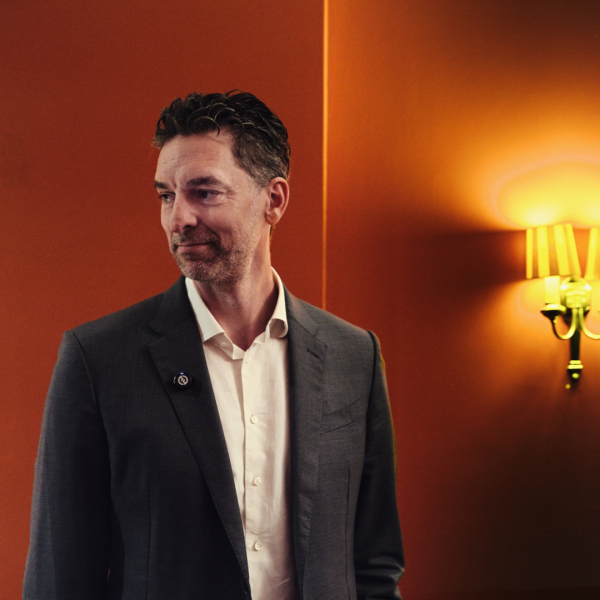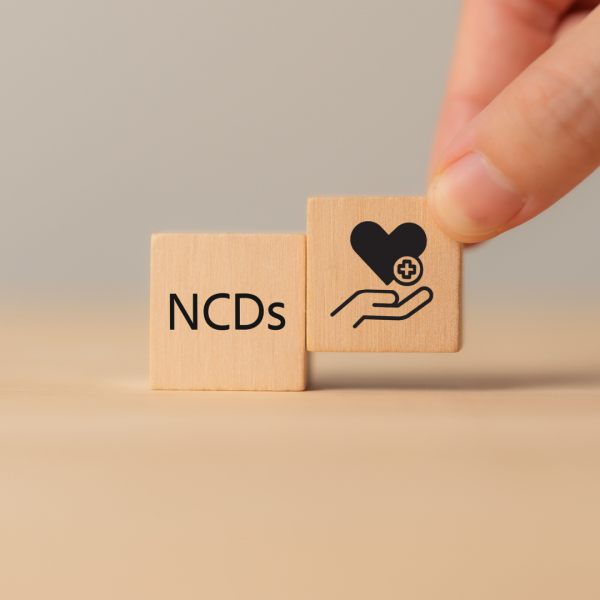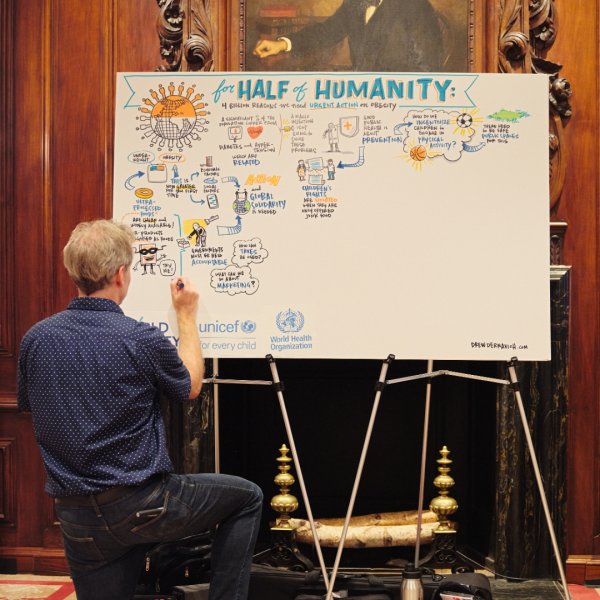From urgency to unity: leaders and advocates chart a path forward
The Global Obesity Forum 2025, co-hosted by the World Obesity Federation, the World Health Organization (WHO), and UNICEF as part of the Global Obesity Coalition, took place in New York ahead of the UN High-Level Meeting on Noncommunicable Diseases (NCDs) and Mental Health.
Leaders, policymakers, and advocates came together with a shared purpose: to confront one of the most pressing health and development challenges of our time. With over 1 billion people currently living with obesity, and nearly 4 billion projected to be affected by obesity or overweight by 2035, the stakes could not be higher.
A space for global leadership
Opening the forum, Dr Simón Barquera, President of the World Obesity Federation, highlighted the uniqueness of the gathering. Rarely are ministers, researchers, health professionals, and young advocates brought together in one room. “Our forum today is about solutions and solidarity,” he said, setting the tone for discussions that wove together science, policy, lived experience, and hope.
The urgency could not have been clearer. UNICEF’s Director of Child Nutrition and Development, Dr Joan Matji, shared a sobering milestone: for the first time in history, more school-aged children are living with obesity than underweight. “What is most alarming is the speed of this change,” she warned, pointing to how children are being pushed away from traditional diets toward ultra-processed foods engineered for profit rather than nutrition. Yet she also offered hope: “Young people are not only the most affected by food systems, but they are also powerful leaders of change.”














Although the Political Declaration from the UN High-Level Meeting failed to include comprehensive action on obesity, in a panel discussion moderated by Ogweno Stephen, a lived experience advocate from Kenya, government representatives showed that countries are taking action into their own hands. We heard how Egypt is integrating obesity services in universal health coverage, scaling up school-based interventions, and fiscal policies like sugar-sweetened beverage taxes.
Greece has made childhood obesity a national priority, providing free counselling and free access to healthy foods and sports. While the Philippines is investing in prevention, integrating obesity policies into urban planning, and regulating unhealthy food environments. Each country shared the same call: global coordination is essential, and we are ready to play our part.
From Mexico, Undersecretary for Health, Dr Ramiro López Elizalde, captured both the struggle and the stakes: “Obesity is an epidemic of our time, an epidemic that breaks bodies and economies and deepens inequality. Obesity does not wait. Our people cannot wait either. Let us build a common front and with courage, cooperation and humanity, we can change the course.”

A space for advocates and lived experience
The forum also spotlighted the next generation of advocates. In conversation with basketball legend, Pau Gasol, young leaders from Jamaica and Fiji described how junk food saturates school environments, how healthy options remain unaffordable, and how screen time has replaced play. Despite the challenges, they also shared what gives them hope:
“What gives me hope amidst all of these challenges? Hearing the commitments that countries have made - that gives me hope. The fact that stakeholders in this room are here in solidarity and willing to commit to changes that will lead us towards reversing some of these statistics, getting them lower. That gives me hope. Just seeing the amount of young people who are now doing what I do, that's really inspiring to me.”







Pau Gasol reframed obesity as a matter of justice: “Children’s rights are not being protected or prioritised, and we have to do something about that—beyond talking about it.” He also reminded us that obesity is not a ‘them’ problem, it affects everyone. “The name of this event today talks about the 4 billion people that are projected to have or live with overweight and obesity by 2035. But I think we have more than more than that, more than those reasons to do that. We have 8 billion. We have the entire world's population. It's an us, all of us, problem, and we need to act now.”
Perhaps the most powerful testimonies came from those with lived experience of obesity.
Johanna Ralston, CEO of World Obesity reminded participants that living with obesity is a ‘multisectoral’ experience and that people living with obesity must be at the table, shaping solutions: “Multisectoral action is critical to obesity, but I also think about the person with the lived experience of all those sectors and how they work together or don't work together. You can't really have a strong policy until you really understand that lived experience.”
Advocates from South Africa and Trinidad and Tobago shared their compelling personal stories and demands.
"I want to hear my government listen to my struggle as a person living with HIV and with NCDs and how important it is for our country to really put systems in place to make sure that we live healthier, productive lives and of good quality." Yvette Raphael
"If we want to really see the changes with respect to obesity and NCDs, we have to bring people with lived experience to the table to tell it as it is." Karen Sealey








Driving solutions through collaboration
In the spirit of the Forum being a place to connect and share ideas with people from across the obesity community, part of the agenda included interactive table discussions where participants rose to the challenge of generating solutions to help shape a new roadmap for addressing obesity. Discussions were held on a range of topics and the summary of ideas generated is presented below.

Obesity & NCDs
- Recognise obesity as a chronic disease, not just a risk factor
- Counter harmful social media narratives
- Build multisectoral coalitions

Childhood Obesity
- Use multisectoral approaches across health, education, food
- Reframe childhood obesity as serious as children smoking.

Financing for Obesity
- Clarify responsibility for funding (public vs. private)
- Frame treatment as prevention for other NCDs
- Provide practical, ready-to-implement funding solutions

Obesity & Food Systems
- Implement fiscal measures (e.g., taxes on sugar-sweetened beverages and ultra-processed foods).
- Enforce front-of-pack labelling and restrictions on junk food marketing to children.
- Ensure access to affordable, healthy foods through subsidies and school meal programs; use local procurement
- Share best practices across countries

Obesity & Physical Activity
- Meet people where they are (set realistic activity goals)
- Remove barriers to participation
- Foster collaboration across sectors to promote physical activity

Obesity & Health Systems
- Integrate obesity prevention and management into universal health coverage.
- Train healthcare professionals to address obesity without stigma.
- Provide multidisciplinary care, including nutrition, psychological, and social support.
- Address comorbidities alongside obesity

Multistakeholder Action
- Develop common language including lived experience
- Balance prevention and treatment approaches
- Recognise treatment as prevention of disease progression
- Build care models beyond healthcare-only approaches
The way forward
The Global Obesity Forum 2025 highlighted both the urgency and the opportunity: while obesity contributes to millions of preventable deaths annually and nearly 3% of global GDP in costs, action now can deliver a 'double dividend' - improving health outcomes while strengthening economies. As governments move forward from the UN High-Level Meeting on NCDs and Mental Health, the Forum made the message clear: no country can act alone, and no credible NCD agenda can succeed without addressing obesity.
In the coming weeks, World Obesity will be synthesising the ideas generated at the Forum to develop a roadmap for action on obesity across sectors, building on our existing work and partnerships, with a renewed focus on obesity in UHC. We plan to publish a paper setting out our roadmap, which will be further developed at the International Congress on Obesity in Mexico next year.
VIEW OUR CAMPAIGN






With Seychelles, Greece and other countries, we will also be supporting a new UN Group of Friends on obesity prevention and control, a core coalition of Member States committed to championing obesity recognition and action within the UN system at the highest levels, working towards the next High-Level Meeting on UHC in 2027.
Closing the forum, Jeremy Farrar reminded what HIV/AIDs has taught us: that it is people and communities that lead change, which politicians then respond to. The final words of the Forum issued a challenge: “What really matters is what each of us, with power and with agency, do when we leave this room, and what do we do over the next week, the next month, the next year? Because without that, the political declarations of New York will mean nothing. So ask yourself, what will I do when I leave this room? That's the responsibility of power.”
The Global Obesity Forum was a call for courage, cooperation, and concrete action. Obesity does not wait, and neither can we.
For half of humanity
Find out how you can join the call for urgent, united action on obesity. Explore resources, key messages, and advocacy tools in our For Half of Humanity campaign toolkit - and help ensure no one is left behind.
OUR CAMPAIGN